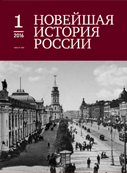«Банки для бедных»: деятельность ломбардов Петрограда-Ленинграда в первое послереволюционное десятилетие. 1918–1928 гг.
“Banks for the Poor”: Activity of Pawnshops of Petrograd-Leningrad during the first Post-Revolutionary Decade. 1918–1928
Author(s): E. D. TverdyukovaSubject(s): History, Pre-WW I & WW I (1900 -1919), Interwar Period (1920 - 1939)
Published by: Издательство Исторического факультета СПбГУ
Keywords: Leningrad; new economic policy (NEP); consumer credit; pawnshop; money loan
Summary/Abstract: Article is dedicated to the activity of Petrograd-Leningrad pawnshops in the first post-revolutionary decade. The activity of the establishments of consumer crediting in the first post-revolutionary years is investigated in the first time in historiography. For the case study author used documents and statistical materials from several archive funds for the central Public Archive of Saint-Petersburg, normative-lawful reports, sources of personal origin. And it is shown that pawnshops played large role in the survival of population in the social cataclysms 1917–1919, especially for the so-called “byvshie”. But credits and loans were received as the elements of bourgeois economic mechanism by the Soviet regime. It became the reason for the municipalization of the pawnshop matter in Soviet Russia in 1919. The creation of joint-stock pawnshops since the beginning of the NEP did not change their economic nature. They worked as social establishments and they were called attend only poor population. Citizens employed the obtained moneys for the daily needs. The data about the postponements of the return of loans and a constant increase in the period of the use of loan testify about the low solvency of the clients of Leningrad pawnshop. The guarantee activity of population is tall during all 1920s. But especially pawnshop credit was claimed under the conditions of social and economic crises. The maximum number of contributions was necessary on 1928 – the year of the coagulation of NEP and worsening in the material position of workers. The investigation makes it possible to come to the conclusion, that the majority of the families of residents of Leningrad used the services of pawnshop. Thus, the pawnshops justified their name «of banks for the poor» in the first post-revolutionary decade.
Journal: Новейшая история России
- Issue Year: 6/2016
- Issue No: 15
- Page Range: 33-46
- Page Count: 14
- Language: Russian

